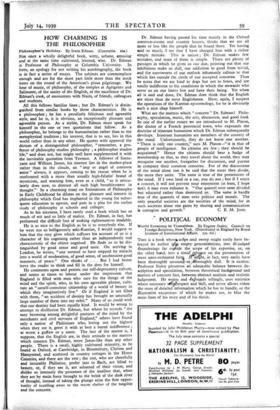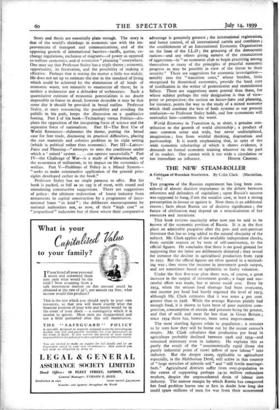POLITICAL ECONOMY
THIS is a book whos‘scope;and sweep might easily have be- trayed its author i14- empty- generalisations, into ill-judged flounderings far ouide the scope of his expertise, or, on the other hand, into a timicrice on the presentation of mere unco-ordinated fact .1nr13 t, in fact, very easily have been thoroughly unsouncl--orAfforoughly dull. It is ncither. Professor Staley preserves an admirable balance between de- scription and speculation, between theoretical background and matters of concrete fact, between abstract analysis and realistic judgement. He writes and Exeousids tellingly, uses statistics
where necessary vOlVrespect and and never allows either the mass of detailed information which he has to handle, or the Illustrative excursions of which he makes use, to blur the main lines of his story and of his thesis. Story and thesis are essentially plain enough. The story is that of the world's shrinkage in economic size with the im- provements of transport and communications, and of the opposing growth of international barriers—tariffs, quotas, ex- change regulations, exclusion of migrants—of power as opposed to welfare economics, and of restrictive " planning " everywhere. One may say that Professor Staley has a triple theme ; economic opportunity, its frustration, and the possibility of making it effective. Perhaps that is stating the matter a little too widely. He does not set up to estimate the rise in the standard of living which could be achieved by the elimination of all kinds of economic waste, nor minutely to enumerate all these; he is neither a technocrat nor a debunker of technocrats. Such a quantitative estimate of economic potentialities is no doubt impossible to frame in detail, however desirable it may be that some day it should be provided in broad outline. Professor Staley, at once renouncing the possibility and avoiding the pitfalls in his path, keeps the discussion on a qualitative footing. Part I of his book—Technology versus Politics—dis- plays the opposition of the integrating force of science and the
separatist force of nationalism. Part II—The Best Use of World Resources—elaborates the theme, putting the broad case for free trade, discussing its practical difficulties, placing the raw materials and colonies problem in its right setting (which is political rather than economic). Part III—Laisser- Faire and Planning—" attempts to state the conditions under which a mixed' system .. . . can operate successfully." Part IV—the Challenge of War—is a study of Wehrwirtschaft, or the economics of militarism, in its impact on the economics of welfare. Part V—Problems of Policy in a Mixed System- " seeks to make constructive application of the general prin- ciples developed earlier in the book."
Professor Staley has no single panacea to offer. But his book is packed, as full as an egg is of meat, with sound and stimulating constructive suggestions. There are suggestions of policy : the ultimate redirection of heavy industry from armaments to capital construction by a programme of inter- national loans " in kind " ; the deliberate encouragement by national authorities not, as now, of their " high cost " or " jeopardised " industries but of those where their comparative advantage is genuinely greatest ; the international registration, and hence control, of all international cartels and combines ; the establishment of an International Economic Organisation on the lines of the I.L.0 ; the grouping of the democratic nations—and any others giving earnest of the renunciation of aggression—in " an economic club to begin practising among themselves as many of the principles of peaceful economic progress as may be possible in view of the threat to .their security." There are suggestions for economic investigation— notably into the " transition costs," whose burden, little recognised by theoretical economics, provide the hard core of justification in the welter of protectionist and restrictionist fallacy. There are suggestions more general than these, for whose subject perhaps the only designation is that of view- point or perspective; the section on laisser-faire and planning, for instance, points the way to the study of a mixed economy which shall combine the best of both systems as our present confusion—so Professor Staley holds, and few economists will contradict him—combines the worst.
World Economy in Transition is, in short, a genuine con- tribution to the growth of world citizenship ; a product of sane common sense and wide, but never undisciplined, imagination ; free from wishful thinking, dogmatism and partisanship. It is worth emphasising that, in spite of the wide economic scholarship of which it shows evidence, it demands no formal economic training whatever on the part of its readers. One cannot wish it too wide a circulation or











































 Previous page
Previous page